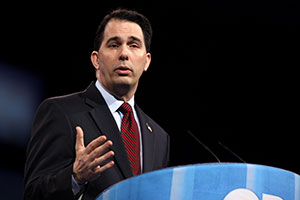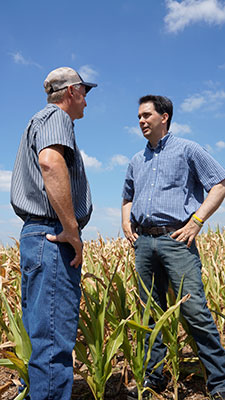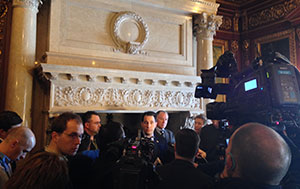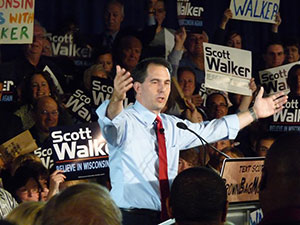Wisconsin Gov. Scott Walker, propane retailers develop propane shortage solutions

Wisconsin Gov. Scott Walker has worked alongside propane retailers since last winter’s shortage to develop solutions and prioritize supply for his state and the Midwest. Photo courtesy of Scott Walker and Chris Tews
Scott Walker’s experience with propane was like most Americans’ until last winter.
Walker has used propane to grill brats, burgers and hot dogs over the years, and having grown up in two small Midwest towns, he continuously saw propane tanks outside homes across his communities.
But the propane experience has been a vastly different one these last nine months for Walker, Wisconsin’s high-profile Republican governor, following last winter’s regional propane shortage.
Last winter’s events put propane at the forefront for Walker and his administration, thrusting him into the media spotlight because he represents propane consumer and business interests. Walker has put propane atop his agenda as head of the Midwestern Governors Association (MGA), and he’s remained in contact with propane industry leaders – all in the hopes of preventing another shortage, with the winter heating season only one month away.
Search for solutions
As the chair of MGA, a group composed of governors from Illinois, Indiana, Iowa, Kansas, Michigan, Minnesota, Missouri, Ohio and Wisconsin, Walker made the propane supply chain his focus – and not just for Wisconsin, but for the rest of the region.
The association met in early June in Madison, Wis., to review last winter and look ahead to this winter.
“It’s not going to be corrected all through one thing,” Walker says, in an exclusive interview with LP Gas. “It’s looking at a number of things. It’s making sure the supply chain is effective. It’s making sure our rail partners are willing to make propane a priority. It’s also things like working with the Farm Bureau to make sure we help farmers if they have the capacity to store propane earlier.”

Wisconsin Gov. Scott Walker believes propane retailers can work together with farmers who have the capacity to store fuel earlier in the year. This is one of many solutions to help avoid future winter shortages, he says. Photo courtesy of Scott Walker and Chris Tews
One program that emerged within Wisconsin following the MGA meeting incentivized Low Income Home Energy Assistance Program (LIHEAP) participants to fill their tanks early. Gary France, owner of France Propane Service Inc. in Schofield, Wis., and National Propane Gas Association chairman during the 2013-14 campaign, suggested the state launch a program along these lines. Walker’s administration obliged.
“If a customer pays at least $50 toward a summer fill, the state would give them $300,” France says. “This did two things: It allowed for some summer delivery. It also made the customer feel like they have a responsibility to pay for their gas in the summer.”
According to France, deliveries in this program were to be made by Aug. 1. He says the state government chose households that had used LIHEAP funds in the past as participants.
“I didn’t have a ton of LIHEAP customers, but I would say about 20 or 30 percent of the people who receive the LIHEAP funds did participate,” France says.
Immediate action
According to Walker’s office, last winter’s shortage affected about 250,000 Wisconsin residents who use propane as the primary source of heat for their home or business. The shortage also sprung Walker into action to help develop solutions for those in need within his state.
“We had some real concerns, and the shortage posed multiple issues,” Walker says. “People were living in their homes [without heat], which was a primary concern for their safety. We made efforts with county, town and tribal governments. We did a couple of public service announcements asking people to check in with shut-ins, elderly neighbors and friends.”
One of Walker’s biggest fears was that his elderly constituents might not be aware of the shortage’s gravity.
“A lot of propane trucks have a delivery schedule set up,” Walker says. “If people weren’t following the news closely, they might not be mindful of the fact that propane was reaching dangerously low levels. So we made an aggressive effort to get the media to run [public service announcements] and ask people to go out and look out for elderly neighbors. They might not be aware that if they are in a regular schedule for a truck to come by and fill them up that it wasn’t going to happen.”
Walker declared a state of emergency Jan. 25 in response to the shortage. Chris Tews, owner of Dale Gas & Oil Co. Inc. in Oshkosh, Wis., and president of the Wisconsin Propane Gas Association, says Wisconsin made it through the shortage largely because Walker united government officials and propane industry stakeholders to develop solutions.
“I felt he really cared about the situation,” Tews says. “It was a top priority for him. I was at one meeting where he had the head of every [state] department in the room and at our disposal. It was kind of amazing.”
France was at that meeting with Walker and Tews. The date was Jan. 27, France says – at the height of the propane shortage.

Wisconsin Gov. Scott Walker addresses the propane shortage in Wisconsin with members of the media back in January. To Walker’s right is Chris Tews, owner of Dale Gas & Oil Co. Inc. in Oshkosh, Wis., and president of the Wisconsin Propane Gas Association. Gary France, owner of France Propane Service Inc. in Schofield, Wis., and National Propane Gas Association chairman during the 2013-14 campaign, is pictured over Walker’s left shoulder. Photo courtesy of Scott Walker and Chris Tews
“[Walker] began the meeting by saying, ‘We know we have a problem. We’re going to fix this. What can we do to help?’” France says. “At that point, we knew we were in good hands.”
Prepared for the worst
France came prepared to that January meeting to explain how the state government could ultimately help propane marketers get fuel to their customers, but he didn’t have to articulate requests too deeply on behalf of the industry. Instead, France left the meeting impressed with the propane supply knowledge Walker and his administration conveyed.
“They had everything in place,” France says. “We had the hours-of-service extensions granted. [Walker] was talking with Gov. [Rick] Perry, [R-Texas], to make sure we could get vehicles down there. They were trying to look at the weight limits because that was a concern.”
Walker learned that the shortage emerged because of several factors – and that it stemmed as far back as the fall of 2013, when crop drying activity was up significantly.
“Getting around the state a lot, I heard early on only about the cost [of propane] and then the supply,” Walker says. “No one thing caused Wisconsin and the Midwest to get in the position it got into later in the winter. The polar vortex played a role in how many days there were severe low temps.”
Keeping Wisconsinites safe and warm at the height of the polar vortex was Walker’s top priority. Some residents were forced to leave their homes because they didn’t have the propane needed to heat them. Walker’s administration prioritized helping the most affected areas across the state.
“We have a very good energy office,” Walker says. “We tracked supply not only by customer but by parts of the state. We saw early on there was an extreme shortage in Marinette County. We could identify other counties – Burnett, Columbia and a handful of others that were affected. We really tried to track the shortage by where we saw the supply diminish.”
Walker was prepared to deploy the National Guard if needed, he says. Fortunately, that was a step he didn’t have to take.
“We had to move a few people out who didn’t have access to propane, but not many,” he says. “We were prepared for large-scale removal if needed. Most folks were able to find shelter with family somewhere within the same vicinity – usually within the same county.”
A pro-business leader
To help ease the burden, Walker reached out to rail companies and asked them to make propane a priority over other goods. The state authorized a weight limit relief order in early January so more propane could be transported in a single trip. Walker and others also worked with the Wisconsin Bankers Association to help marketers secure propane for their customers.
“One thing we found was that at the distribution point [suppliers] wanted money upfront,” Walker says. “The mom-and-pop businesses weren’t budgeting for that, so we provided a [loan] guarantee and worked with the Wisconsin Bank Association to make sure there were no barriers in getting propane [where it was needed].”
Walker’s approach as governor was beneficial because he didn’t assign blame to any involved parties, France says.
“We are very fortunate to have a pro-business governor,” he says. “If we would have had a strict pro-consumer-type governor, I think we would have been in big trouble – especially because the brunt of some of the big propane pains were in Wisconsin and Minnesota.
“I don’t know all the details,” France adds, “but I believe in Minnesota they had some people who were putting a lot of the burden on propane marketers, wanting them to show costs. Those are the types of things we could have been up against if a governor chose to take a position that this was a concerted effort to gouge the public. There was never any sense of that whatsoever.”
Next step: The White House?
Last winter’s propane shortage isn’t the only event that’s thrust Gov. Scott Walker, R-Wis., into the national spotlight in recent years. After Walker was elected as Wisconsin’s governor in 2011, he made significant budget cuts that sparked protests at the state Capitol.

Some political analysts say Wisconsin Gov. Scott Walker is a potential Republican candidate for the presidency in 2016. Photo courtesy of Scott Walker and Chris Tews
The next year, Walker was engaged in a summer recall election to retain his seat as governor. Walker successfully retained the seat, becoming the only governor in U.S. history to win a recall election.
Walker is up for reelection this year in a race that’s once again drawing national attention. But the spotlight is on this race largely because of its potential impact on the 2016 presidential race.
Political analysts have frequently cited Walker as a potential Republican presidential candidate for 2016. Charles Krauthammer, a conservative Washington Post columnist and a regular contributor to Fox News, listed Walker as one of six potential Republican candidates for 2016 during his keynote speech at this year’s Propane Days.
Political analysts like Krauthammer say a loss this November would damage Walker’s chances for a run in 2016. Regardless, Krauthammer is excited about the potential Republican field. Besides Walker, Krauthammer listed Gov. Bobby Jindal, R-La.; Gov. Nikki Haley, R-S.C.; Gov. Chris Christie, R-N.J.; Sen. Ted Cruz, R-Texas; and Sen. Rand Paul, R-Ky., as potential presidential candidates during his Propane Days address.
“They’ll work it out,” Krauthammer said at Propane Days. “We’ll probably only see seven or eight debates. The Republican brand was deeply damaged by having 22 debates [for the 2012 presidential election] because of the weak field.”
















